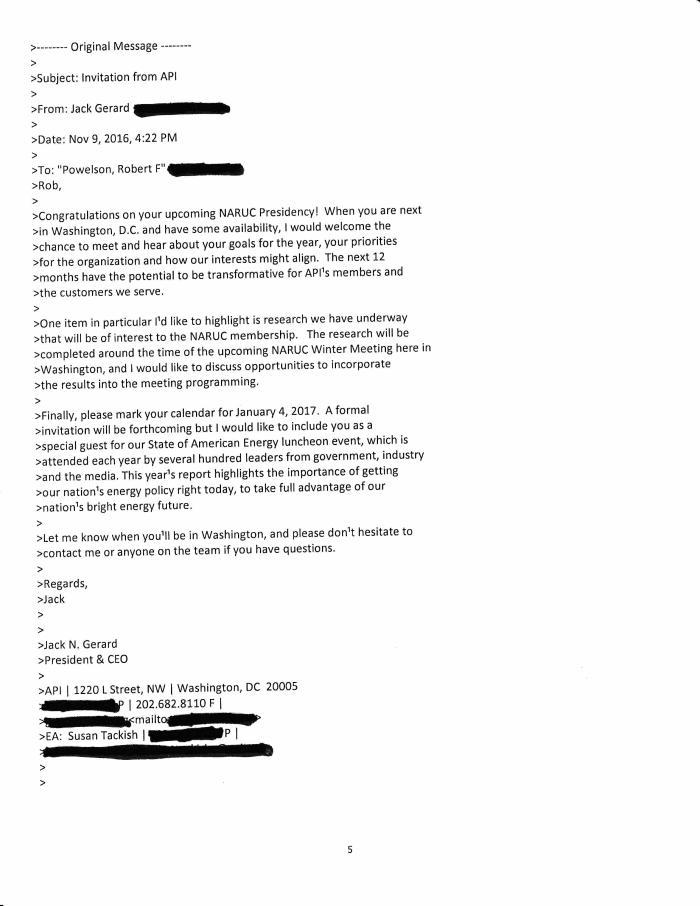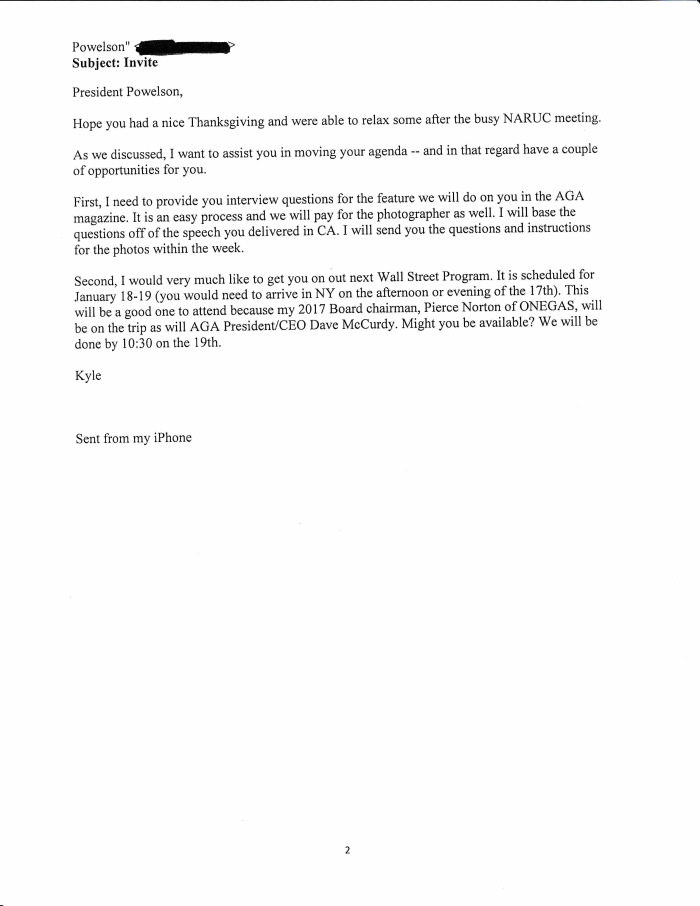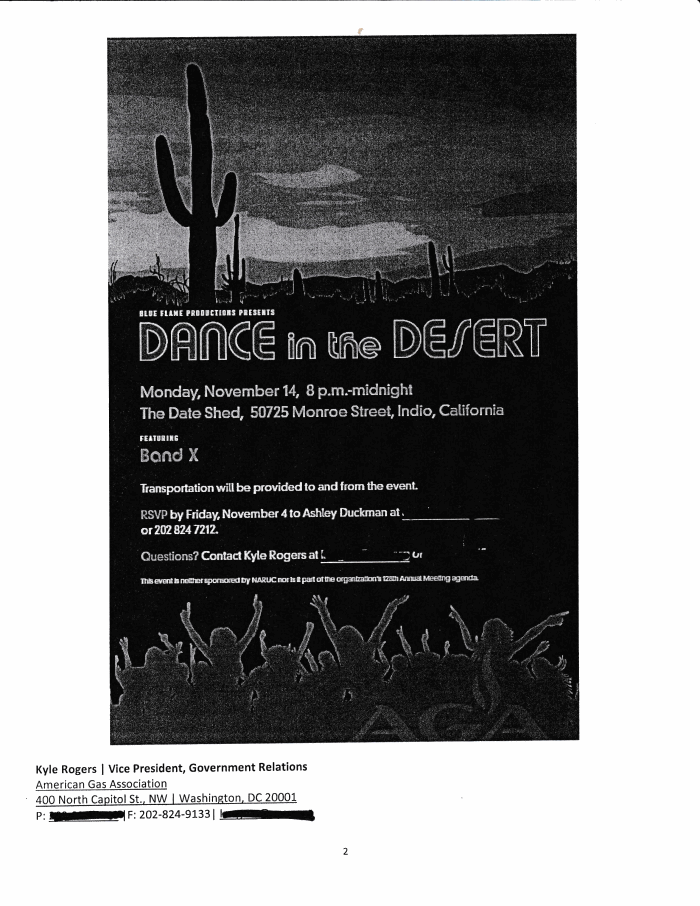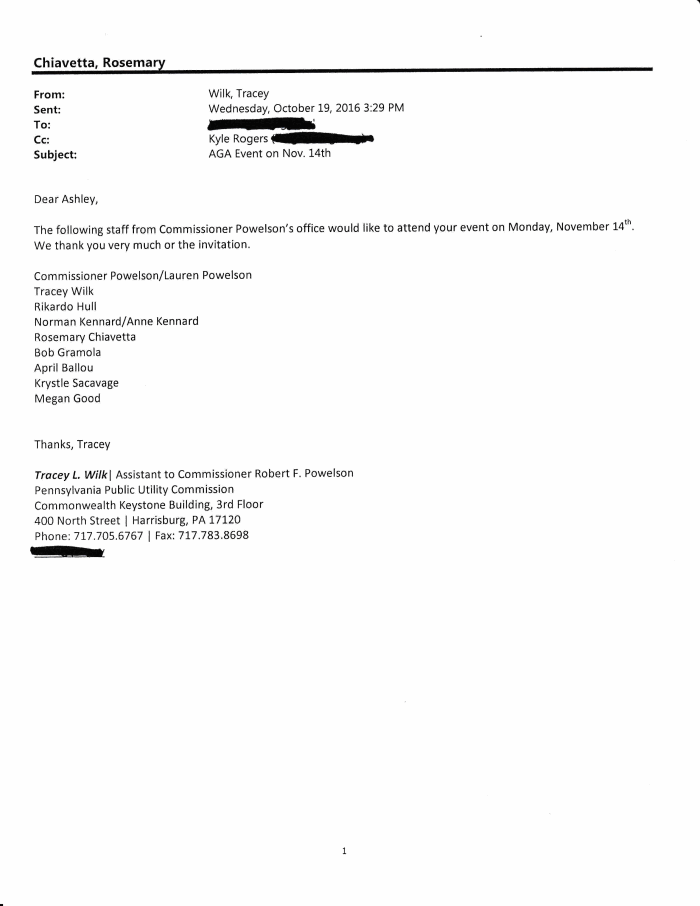Rob Powelson, reported to be one of President Trump’s nominees to the Federal Energy Regulatory Commission, would enter the job with a track record that shows a cozy relationship with the natural gas industry, according to past public comments made by Powelson as well as emails obtained by the Energy and Policy Institute.
Powelson has been a commissioner on the Pennsylvania PUC since 2008, and became the president of the National Association of Regulated Utility Commissioners (NARUC) in 2017.
Numerous media outlets have reported that Powelson will be one of President Trump’s three picks to FERC, which is responsible for permitting oil and gas pipelines, overseeing environmental matters with respect to natural gas projects, and regulating and monitoring the country’s organized electric markets. The other names rumored to be Trump appointees are Neil Chatterjee, an aide to Mitch McConnell with a history of leading attacks on clean air protections, and Kevin McIntyre, an attorney who has represented fossil fuel and utility interests before FERC.
FERC commissioners are supposed to decide cases based on facts and data and without favor for any particular industry: the agency says it is “neutral as to fuel source.” Powelson’s record casts doubt on whether he would be able to meet that standard.
Statements reflect Powelson’s loyalty to gas producers
Powelson has not been shy about his support for gas production, or his antipathy for environmentalists concerned about the industry. At a meeting of the Mid-Atlantic Regulated Utility Commissioners (MACRUC) last year, Powelson, speaking about gas pipelines that have become contentious due to protests, said:
“Pennsylvania, as I said earlier – second largest natural gas production state now in the country. We’re producing about 3 BCF [billion cubic feet] a day and I think that’s a great story, but the reality is, and it’s a very big issue, is we’ve got to develop markets to get this gas to these load centers. And we don’t have an economy in Pennsylvania where we can use all of this.”
Powelson continued:
“For all my lacrosse moms who badger me about shale gas production and how environmentally unsafe it is and you’ve got all these people from Texas destroying the Pennsylvania environment and we don’t like that, and then you start talking to them with some good factual data and [they say] it’s not about the money: it’s about the money.”
The comments are typical of Powelson’s rhetoric: pro-industry and dismissive of environmentalists’ concerns about gas development’s effects on the environment or the climate.
In an email to the Energy and Policy Institute, Commissioner Powelson defended his record as balanced.
“I believe that natural gas development has brought a great deal of positive benefits to utility customers, including lower prices and a cleaner way to generate electricity,” Powelson said. “However, the economic and environmental benefits are not the only parts of the equation when it comes to natural gas. Pipeline safety is an extremely important part of the conversation and one that I am very passionate about.”
Natural gas emits less carbon when burnt than coal, which it has helped to displace in the electricity mix, but gas production results in leaks of the super greenhouse gas methane, negating some of those carbon gains. Environmental groups have reported that the current rush to gas by electric utilities is not compatible with the goals for greenhouse gas reductions that the U.S. set in the Paris Agreement.
Powelson cited his support of a 2011 Pennsylvania law, the Gas and Hazardous Liquids Pipelines Act, which gave the Pennsylvania PUC the authority to enforce federal pipeline safety laws, and his support for the federal Safe Pipes Act, which President Obama signed last year. The Pennsylvania law covered 1,200 miles of pipelines in the state’s densely populated areas, but did not regulate 12,000 miles of rural pipelines.
Powelson has reserved his most explosive language to describe pipeline protestors. Speaking in March at a gas industry conference, Powelson said that environmental advocates were on a “jihad” to keep natural gas from reaching markets while railing against activists who demonstrated outside the home of former FERC commissioner Tony Clark, accusing him of being a “rubber stamp” for the gas industry. (Clark went on to work for a firm that lobbies for gas companies and utilities after departing FERC, the latest in a parade of FERC commissioners and staff to leave their government job to take one in a regulated industry.)
The Clean Air Council, a Philadelphia-based environmental non-profit, called for Powelson to resign after the “jihad” comment, and other groups accused him of bias toward the gas industry.
“There’s a contempt we’ve seen from Commissioner Powelson that totally belittles the concerns of people in the community or who are advocates for clean air around gas issues,” Joe Minott, Clean Air Council’s executive director, told the Energy and Policy Institute. “And that to me suggests that he really should go work for the gas industry and not be a regulator. If as a regulator you have that much contempt for the legitimate concerns of residents and environmental advocates and healthcare professionals that you’re willing to refer to them as jihadists, it doesn’t suggest an open mind when it comes to regulating the industry.”
Powelson walked back his use of the word “jihad” publicly and in an email to the Energy and Policy Institute, while otherwise defending his comments:
“As I have noted publicly, I recently made an inappropriate choice of words while characterizing the actions of a small group of individuals who engage in threatening and disruptive behavior,” Powelson said. “Unfortunately, this has distracted from a very real concern about threats aimed at shutting down public debate: interrupting public meetings, preventing officials from speaking, harassing federal and state regulators along with their families, and otherwise attempting to halt the public discussion about important infrastructure projects.”
Powelson’s support of the gas industry is not new. According to UtilityDive, he drove the 2009 passage of a NARUC resolution saying that states, and not the federal government, should regulate fracking. The resolution was a favor to natural gas drillers, and out of scope for NARUC, as utility commissioners do not regulate how gas is produced.
Emails show closeness with oil, gas lobbyists as NARUC president
Emails between Powelson and natural gas and utility lobbyists, obtained via public records requests, show that Powelson has continued to expand his relationships with the oil and gas industry as NARUC’s president.
The day after the 2016 elections, Jack Gerard, chairman of the American Petroleum Institute, the behemoth oil and gas group, emailed Powelson to congratulate him on his recent ascension to president of NARUC and ask for a meeting:
Powelson accepted the meeting with Gerard, and NARUC devoted much of its programming at its February 2017 meeting to the benefits of natural gas, including a chance for API to highlight a recent study touting the economic benefits – though none of the costs – of natural gas, which Gerard referenced in his email to Powelson. API was a “Leadership Sponsor” of the meeting, for which it paid $13,500, the most expensive sponsorship package available.
Powelson defended NARUC’s programming in an email to the Energy and Policy Institute.
“NARUC fields many requests from a variety of groups to participate in our tri-annual meetings and we work to foster a broad discussion … We try to include a variety of perspectives in these panel discussions,” Powelson said.
A scan of the February meeting agenda shows that gas-related panels featured 29 speakers from the gas and utilities industries or related attorneys and consultants; 14 speakers came from governmental or other more neutral organizations; just two could be described as environmental advocates, and both worked for the Environmental Defense Fund.
A few weeks after Powelson’s email exchange with API, he received one from Kyle Rogers, a lobbyist who focuses on state regulators with the American Gas Association:
Powelson did indeed end up on the cover of the AGA magazine.
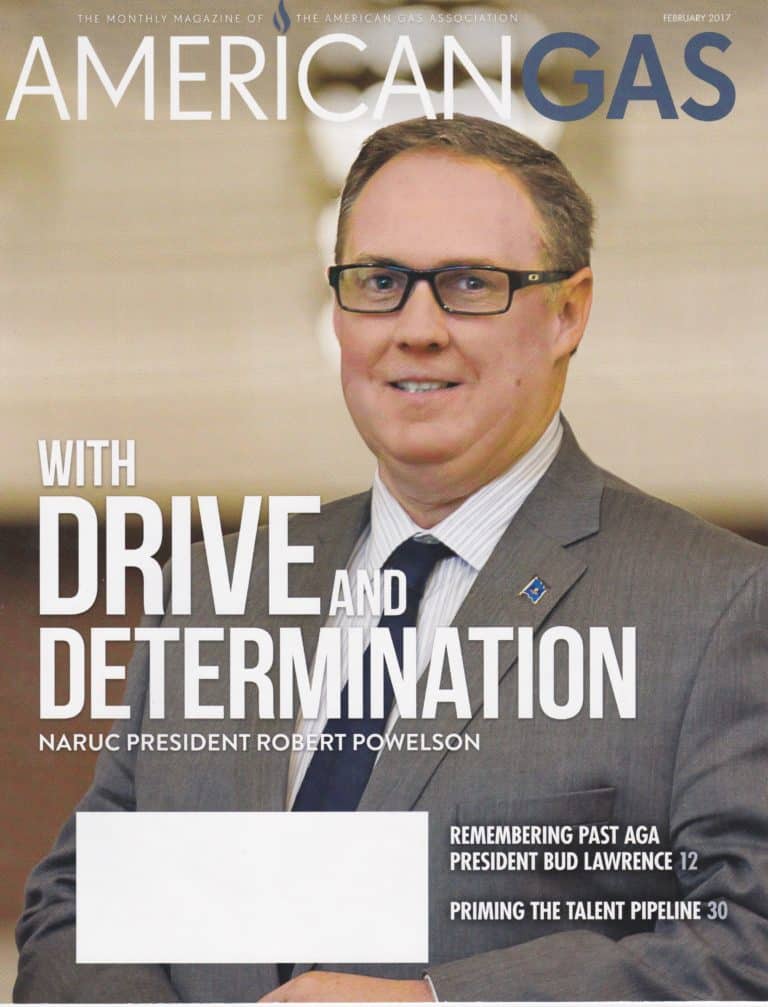
Rob Powelson, Pennsylvania PUC Commissioner and possible FERC nominee, on the cover of the American Gas Association magazine
In November, Powelson received an invitation from Rogers to the AGA’s “Dance in the Desert,” a party that the trade group threw after one of the days of the NARUC conference in November, 2016, which was held in Palm Springs. The AGA regularly hosts parties at the NARUC conference.
Powelson’s aide wrote back to Rogers that Powelson, his wife, and eight of his staff would attend.
The party, which was held at the Date Shed, a bar and lounge in Indio, CA, featured multiple open bars, catering offering short rib sliders, shrimp cocktails and ahi tuna mini tacos, and a rock band flown in from Atlanta. AGA hired a vendor to provide dealers and card tables for the commissioners, staff and lobbyists present to play casino games.
Commissioner Powelson told the Energy and Policy Institute that he did not attend the AGA party, despite his “Yes” RSVP, due to a scheduling conflict. He defended the RSVP, though, saying that it did not run afoul of the PUC’s Professional Ethics code which prohibits Commissioners and PUC staff from accepting gifts that would influence their decisions:
“I abide by the PUC’s gift ban and I believe in the importance of policies such as these. There are exceptions to the gift ban, such as the one that allows Commission employees to go to (and accept food and refreshment of nominal value from) widely attended gatherings; that is, gathering that are open to all persons interested or associated with the subject matter of the gathering. I have participated in certain widely attended events that are permissible under the gift ban, but always with an eye to what is appropriate and acceptable in my role as a state Commissioner.”
A PA PUC spokesperson added, upon being shown Powelson’s RSVP to the AGA party: “It is our understanding that AGA invites all NARUC participants to attend their event, making it a widely attended gathering.”
The AGA party was not advertised nor accessible to the public. The AGA shuttled commissioners and lobbyists from the conference to the party on private buses, and the invite explicitly noted that it was not a part of NARUC formal programming. Registration for the NARUC event was $875, plus travel costs.
Powelson on his and his peers’ regulatory independence
In remarks at the Southeastern Association of Regulatory Utility Commissioners (SEARUC) in 2016, Powelson addressed controversies around utility commissioners’ relationships with the companies they regulate, and set the bar low for what constitutes avoiding conflicts of interest for a utility commissioner:
“The last time I checked, not one of us owned stock in a public utility. Not one of us is out there serving on the corporate board of one of our public utilities.”
A utility commissioner sitting on a utility’s board would be an egregious ethical breach. In the same speech, Powelson expressed outrage at criticism of commissioners’ integrity, while in the same breath thanking industry sponsors for rushing to commissioners’ defense:
“I want to assure you these attacks are not going away. They’ve gotten visceral in nature, but I’m proud of NARUC, I’m proud of other associations in this room, some of them our sponsors, that are stepping up to say ‘these public utility commissioners are representing the public interests.’ [emphasis added].
The American Gas Association and American Petroleum Institute sponsored the SEARUC meeting, among other industry groups.
The gas industry, for its part, seems pleased with its new potential federal regulator. One article from an industry news site which boosts gas drilling in Pennsylvania praised Powelson’s “jihad” comment as “so true.” In a subsequent piece, the news outlet wrote:
“Lips are flapping around Washington and several names are being circulated as potential nominees. One of them REALLY excites us: Rob Powelson. … Wouldn’t it be terrific if this Marcellus-loving regulator were the third new FERC commissioner appointed by Trump?

